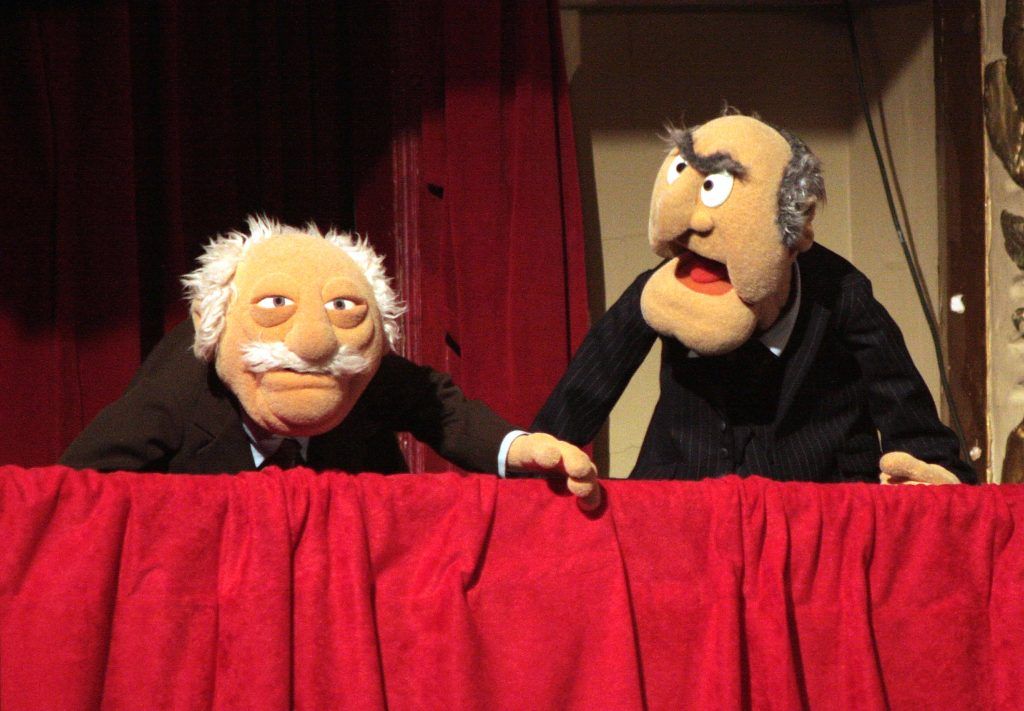A generation gap, when it comes to climate change?
By Dana Nuccitelli | March 15, 2019
 Image from climate scientist Dana Nuccitelli’s Bulletin article “A generation gap, when it comes to climate change?” Photo courtesy of Getty Images.
Image from climate scientist Dana Nuccitelli’s Bulletin article “A generation gap, when it comes to climate change?” Photo courtesy of Getty Images.
(Editor’s Note: Judging from recent letters to the editor, there seem to be a lot of young people who will be skipping class today to go on strike against climate change. And a lot of older people who are accusing them of just wanting an excuse to walk out of school on a Friday. It seems that there is a climate change generation gap going on. So we thought this would be a good time to re-print this 2016 article by climate scientist Dana Nuccitelli, about this little-acknowledged angle to the climate change discussion.)
A record number of Americans now view global warming as a serious threat and blame human activities as the cause. But there is apparently a generation gap out there when it comes to accepting the scientific evidence. And an ethnic gap, a gender gap, and a gap in political leaning—along with whether one can be considered one of society’s “haves” or “have nots.” So, who are these climate deniers? What is their profile?
A June 2014 Washington Post-ABC News poll asked a nationally representative sample of American respondents several questions about their support for climate policies. Specifically, those surveyed were asked whether they would be in favor of government greenhouse gas regulations that increased their monthly energy expenses by $20 per month. Overall, 63 percent of respondents expressed support for the proposed policy, including 51 percent of Republicans and 71 percent of Democrats.
Interestingly, there was a significant age gap among the responses. For Democrats under age 40, support for the policy proposal was 78 percent, as compared to 62 percent over age 65. Among Republicans, 61 percent under age 50 supported the proposed regulations, as compared to 44 percent over age 50. According to a Pew Research Center survey, younger Americans are also more likely to correctly answer that the planet is warming and that this warming is primarily due to human activities.
The climate acceptance age gap. Unfortunately, there’s been little research that investigates the causes of this age gap. It is tempting to speculate that perhaps younger minds are more open to new ideas—such as the potential for humans to alter something as large and complex as the Earth’s climate, ushering in a new “Anthropocene” geological epoch. Perhaps our educational system is succeeding in teaching these concepts to younger generations.
In fact, the acceptance of the evidence for human-caused global warming may grow as the climate change curriculum improves in American science classes. The challenge is that teachers are human—which means that their political and religious beliefs sometimes get in the way, as do the cultural biases of the local community in which they teach, and their community’s attitudes toward the role of government. A recent survey conducted by the National Center for Science Education found that teachers who identified as Republicans, teachers who regarded the Bible as the actual word of God to be taken literally, and teachers who favored libertarian and small-government views, were all less likely to emphasize the scientific consensus on climate change and more likely to air opposing views in the classroom.
Consequently, this survey of US middle and high school science teachers found that while approximately 70 percent of these teachers spent one to two hours on climate change per course, only 54 percent taught students about the scientific consensus on human-caused global warming. Thirty percent incorrectly characterized climate change as being natural in origin, and 15 percent ignored the origins of climate change or the topic of climate change entirely. Although the survey identified systemic obstacles to teaching about climate change in American classrooms, those obstacles will eventually be overcome, and climate literacy will improve as a result—at least among the younger generation.
Exposure to the opinions of one’s peer group may also help explain the climate age gap, as older men are the most common faces of climate denial. For example, in 2009 the American Physical Society was petitioned by 206 of its members (approximately 0.45 percent of its membership) to change its climate position and reject the expert consensus on climate change. An analysis of the petition signatories by John Mashey found that approximately 86 percent were born before 1950 (compared to approximately 40 percent of the society’s membership as a whole), and 97 percent were born before 1960 (compared to approximately 60 percent of the overall membership). Climate denial conferences are also disproportionately attended by old white men.
But age is not the only predictor of climate change denial.
The climate acceptance ethnicity gap. African- and Hispanic-Americans were also more likely to correctly answer the Pew Research Center climate questions—and to express concern about climate change—than white Americans. Fifty-nine percent of Hispanic-Americans and 52 percent of African-Americans understand the reality of human-caused global warming, as compared to just 41 percent of white Americans. And 70 percent of minorities express concern about it, as compared to just 50 percent of white Americans. A 2010 report by Anthony Leiserowitz and Karen Akerlof similarly found that minorities were more likely than white Americans to support regulating carbon dioxide as a pollutant, implementing a carbon cap and trade system, and signing international climate treaties.
The ethnicity gap (and the age gap) can likely be explained in part by certain groups’ general preferences for maintaining the status quo. Social scientists have identified what they’ve termed the “white male effect,” describing the fact that white males tend to be less concerned about various sources of risk than minorities and women. Scientists have speculated that this effect largely stems from the fact that mitigating these risks could result in restrictions on markets, commerce, and industry that have historically tended to disproportionately benefit white males. In other words, if you are already doing well from the system, you’re less inclined to change it—no matter how much the ice melts and the oceans rise. In their 2011 paper “Cool Dudes,” Aaron McCright and Riley Dunlap concluded: “The unique views of conservative white males contribute significantly to the high level of climate change denial in the United States.” And climate change denialism is largely—but not exclusively—a US phenomenon.
In fact, their research found that conservative white males who express the highest confidence in their opinions about climate science and risks are the most wrong, and in the most severe denial. McCright and Dunlap concluded that “climate change denial is a form of identity-protective cognition, reflecting a system-justifying tendency.” This may also contribute to the age gap, since younger Americans have not yet benefitted from the societal status quo to the same degree as older Americans.
Minorities also tend to be disproportionately affected by the negative consequences of climate change, and realize the benefits of addressing it. For example, minorities are more likely to live in close proximity to coal power plants and their associated air pollution. Cutting carbon pollution would result in fewer coal power plants, and hence cleaner air for these populations. Many minorities have also recently emigrated from countries that are more vulnerable to climate change impacts. In other words, some minority groups (particularly Latinos) are more likely to have “transnational ties,” and an awareness of how people in other countries think about and are affected by climate change.
Public acceptance of human-caused climate change will only grow. In a new paper my colleagues and I published on April 13 in Environmental Research Letters, the authors of seven separate studies on the climate consensus joined together to conclusively demonstrate that 90 to 100 percent of climate science experts and their peer-reviewed research agree on human-caused global warming. We found that consensus rises with greater climate expertise, with a majority of our surveys finding 97 percent consensus among the most-published climate scientists and their peer-reviewed research. Currently, only 12 percent of Americans realize that the expert consensus is so high. We call this discrepancy between public perception and reality the “consensus gap,” and it will only shrink over time as more people become aware of just how many experts agree on state of the evidence for human-caused climate change.
Similarly, the impacts of climate change on human society will only become more apparent over time. A recent report by the National Academies of Science concluded that climate scientists can already identify the human activity that caused the intensification of some types of extreme weather like heatwaves, droughts, and heavy precipitation events: heatwaves became hotter, droughts drier, and monsoons wetter. As global warming continues to progress, the associated climate changes, like these extreme weather events, will only become more apparent to the general public.
All the indicators are pointing in the direction of increased public awareness and concern about the dangers of human-caused climate change. Concern is highest among American minority groups, who will outnumber whites within a few decades. It’s highest among younger Americans, who will outlive older Americans. And concern will only grow as the climate continues to change, as its associated effects become more severe, and as more Americans become educated about climate science and the 97 percent expert consensus on human-caused global warming.
At the same time, a 2015 paper found that the Republican Party stands alone as the only major political party in the world that rejects the need to address climate change. Given the realities of climate change and growing public awareness and concern, including among the party’s own young constituents, this is simply an untenable long-term position. Some have written that climate change is the new gay marriage,an issue on which the Republican Party leadership has taken a stand on the wrong side of history—potentially alienating many voters, particularly among younger generations. The youth vote (18-29 year-olds) has increasingly gone against Republicans since the turn of the century, and research has shown that voters tend to stick with whichever political party they first join.
Climate denial caters to a small and dwindling population of old, white, conservative, American men. As with global temperatures, American acceptance of and concern about human-caused climate change is currently at record levels, and is certain to keep rising in the long-term.
Together, we make the world safer.
The Bulletin elevates expert voices above the noise. But as an independent nonprofit organization, our operations depend on the support of readers like you. Help us continue to deliver quality journalism that holds leaders accountable. Your support of our work at any level is important. In return, we promise our coverage will be understandable, influential, vigilant, solution-oriented, and fair-minded. Together we can make a difference.
Keywords: climate change, climate change communication, climate change research
Topics: Analysis, Climate Change















Great article. However, USA’s Republican Party is not “The only” major party in the world to reject the science of climate change. Australia’s Liberal- National Coalition government still has MP’s who reject it publicly , and pursues a policy of climate change denial, (whatever lovely things that the PM may mouth occasionally). Former PM Tony Abbott explained that climate change is “a hoax”
This article misses an obvious correlation. The age gap among Republican voters aligns well with the demographics of Fox viewers, who have been subjected to a steady diet of climate change denialism. Also, Fox sensationalized the faux scandal “Climategate” for months with no retraction or balancing coverage on the ultimate clearing of the scientists involved of any wrongdoing by separate investigations conducted by eleven separate scientific and government organizations. Fox viewers remain skeptical of climate scientists to this day as a result.